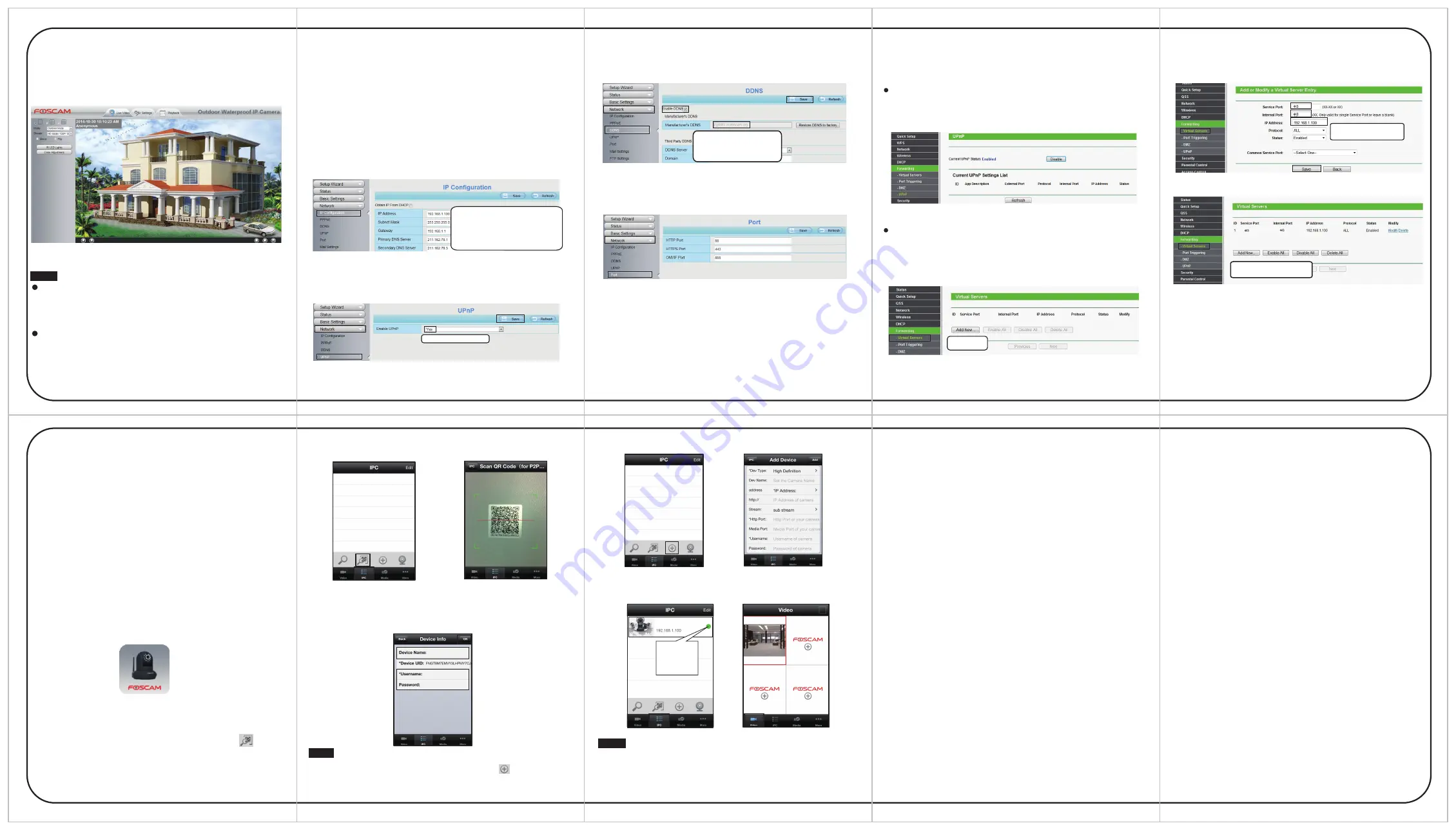
FI9853EP
5.
After logging in, you should see live video on the interface.
5
Access the IP Camera
by Smart Phone
7
Technical Support
6
Access the IP Camera
by CMS
To access a remote camera on a Windows PC, please install the
CMS software. For the installation file and user guide for the CMS
software, please refer to the Foscam IP Camera Client user
manual in the CD.
If you use a mobile device that runs iOS or Android, you can
use our free app,
Foscam Viewer
, to access the camera
through the LAN or Internet. Let’s use the iPhone app in the
following example. The user interface and operations in the
Android app are similar to those in the iPhone app.
3.
When you finish QR code scanning, the UID will be input
automatically, then input the
Device Name
,
Username
(default is
admin), and
Password
(blank by default). Then tap
OK
.
2.
Firstly, make sure your mobile device and the camera are
connected to the same router. Tap on the app icon to open
the app. In the IPC section on the bottom, click the button.
Your phone will go into QR code scanning mode.
Note:
If the QR code scan is not successful, click the button , and input the
UID manually (located under the QR code). Input all other information,
and then tap
Add
.
4.
So far, the camera has been added successfully. You can tap it
from the list to check live video.
1.
Search and install
Foscam Viewer
on the App Store or
Google Play store for iOS or Android devices.
Note:
To learn more detailed app features, please refer to the app
user manual on the CD. Location of the file: “Smart phone App
> For Android / For iOS > Android App User Manual / iOS App
User Manual”.
The green point
means the
connection is
successful.
Notes:
After logging in for the first time, it will go to "Setup Wizard”
automatically. Please set the basic parameters, such as the
camera name, camera time, and more.
If you forget your username or password, you can press and
hold the reset button on the cable of the camera for 5 seconds.
This resets the camera to factory defaults.
4
Remote Access
2.
Enable UPnP and DDNS in the camera’s settings page. We
recommend you to use the Foscam DDNS by factory default.
Select
Yes
and click
Save
.
If you want to access your camera via web browser outside of
your network, you need to configure some settings.
1.
Choose “
Settings
” on the top of the camera web page, then
go to the “
Network> IP Configuration
” section on the left
side of the screen. From here, uncheck
Obtain IP DHCP
.
IP Address:
Set this in the same subnet as
your computer , or keep it as default.
Subnet Mask:
Keep it as default.
Gateway
and
DNS Server:
Set it to the IP
address of your router.
We hope your experience with the Foscam IP camera is
enjoyable and easy to use. If you experience any issues or have
any questions that this Quick Installation Guide has not
answered, please contact our support department via the
websites listed below 24 hours a day, 7 days a week.
Foscam Digital Technologies
www.foscam.us www.foscam.ca www.foscam.co.uk
www.foscamgroup.com
www.foscam.com
Click
Enable DDNS
and click
Save
.
The content in the Manufacture’s
DDNS column is the domain name
of your camera.
Click Add New.
5.
Now you can access your IP camera by https://domain
name: HTTPS port via the Internet.
For example, you can type the following in a web browser:
https://cg8881.myfoscam.org:443
3.
You can check the port of your camera here. If you want to set
Remote Access for several cameras on the same network, you will
need to change the HTTPS port for each camera.
4.
If UPnP has been enabled in the router, you do not need to
perform the following steps. If UPnP is disabled, you need to
select one of the following methods to configure port forwarding
on your router. For these steps, we will be using the TP-LINK brand
wireless router as an example.
If there is a UPnP function in your router.
Choose “
Forwarding > UPnP
”, make sure that the
Current
UPnP Status
is
Enabled
.
Input the port and IP address
of your camera and click Save.
Here you have finished the Port
Forwarding setup.
You need to manually add port(HTTPS port) forwarding, refer
to the following steps. You need go to the “
Forwarding >
Virtual Servers
” panel for setup.
If there is no UPnP function in your router.


